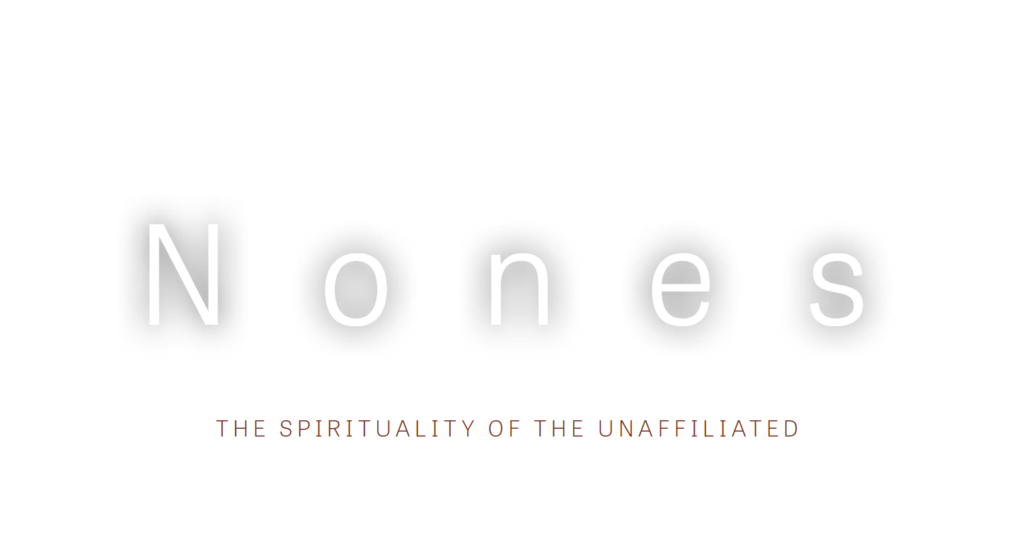Have you heard about the Nones? No, we’re not talking about the habit-wearing counterparts to monks, but to those who mark “none” for the religious affiliation category on surveys of religious belief. Over the last two decades, the number of those who do not identify with any religious tradition has increased dramatically. They are often called, simply, the Nones.
History
In the broadest sense, this category includes those who deny God’s existence (atheists) and those who refuse to say either way (agnostics). These are a relatively small minority, and their numbers have remained remarkably consistent over the years. For example, from 2009 to 2019 atheists and agnostics have each remained around 2–4% of the American population. However, in the same timeframe, those who have disaffiliated (marked “none” for a religious affiliation) rose from just under 15% to 20% of the U.S. population.[1]
These statistics leave us with a fascinating question: What does the remaining 16–18% of the “nothing in particular” crowd believe? A significant majority of this group that marks down “none” still believes a divine being exists or that there is some type of spiritual existence. In 2012:
Two-thirds of [the religiously unaffiliated] say they believe in God (68%). More than half say they often feel a deep connection with nature and the earth (58%), while more than a third classify themselves as “spiritual” but not “religious” (37%), and one-in-five (21%) say they pray every day.[2]
The intervening decades have only made the statistics much more dramatic.
The cause of the dramatic rise in the Nones is not singular; numerous factors including increasing secularization, the drop in social desirability of the Christian religion and the rise of the internet all play a role.[3] Now, those who identify as religiously “none” number among the largest religious groups in the U.S.
Documents
Throughout this issue of LW, we examine the sacred texts of the various religions and how these religious groups identify with their texts. We want to know what external authority drives their actions or inaction.
A hallmark of Nones, however, is the lack of sacred texts, the lack of authoritative documents to guide their faith and belief. They build their system of thought on a rejection of external authority. They object to the external imposition of a religious belief from the outside, apart from their own preferences and desires. Rather than a religion built upon “stifling” creeds and sacred texts, Nones prefer the free, intuitive expression of personal spiritual beliefs and practices.
Today’s Remixed reject authority, institution, creed, and moral universalism. They value intuition, personal feeling, and experiences. They demand to rewrite their own scripts about how the universe, and human beings, operate. … [T]oday’s Remixed don’t want to receive doctrine, to assent automatically to a creed. They want to choose — and, more often than not, purchase — the spiritual path that feels more authentic, more meaningful to them.[4]
The author of the above quote, Tara Isabella Burton, is discussing a broader category of folks that she called the “Remixed,” who prefer to mix and match their religious beliefs and preferences. The Nones are part of this Remixed group.
In short, the key “documents” of the spiritual practices of the Nones are personal experiences and feelings.
Key Beliefs
Since Nones primarily seek personal fulfillment and meaning in their experiences, their religious beliefs are difficult to pin down. A None might enjoy grandma’s church on Christmas Day, but use eastern meditation for his mental health throughout the week. That said, there are still some key frameworks that guide their beliefs.
The first key belief of the Nones is diversity and pluralism. Pluralism says that we must each coexist without critiquing the beliefs of another. Whereas, universalism says all religions go to the same place, pluralism says that you might be right and the others wrong — just do not criticize others. So, if you find meaning and purpose in life partially in eastern meditation, partially in video games and in performance theatre, all the better. Do whatever works for you.
This leads to a second key belief of the Nones about the purpose of religion. Religion is not about reconciliation with God and therefore also our brothers in Christ. Instead, religion is simply a way to find meaning and purpose in life. Burton identifies “four elements of human need” provided by religion: meaning, purpose, community and ritual.[5] Religion, as defined by Burton, provides each of these four elements entirely apart from the existence of God. The None, then, seeks experiences that fulfill his spiritual needs.
As the Nones tend to focus on religion subjectively — that is, on themselves — so also, the Nones tend to find truth largely in their own feelings. Consider Merriam-Webster’s definition of the increasingly popular term “truthiness,” which does not refer to the truthfulness of something, but to a feeling of truth:[6]
A truthful or seemingly truthful quality that is claimed for something not because of supporting facts or evidence but because of a feeling that it is true or a desire for it to be true.[7]
Something is true when it “feels” true, irrespective of reality.
We Confess
One last feature of the Nones makes the work of faithfully confessing to them quite difficult: They are apathetic about the faith. They do not care. Despite the dramatic efforts of many churches to reach seekers, the Nones are simply not seeking.[8] They happily live their lives with a general belief in the existence of God or some spiritual force that is largely not interested or involved in their daily lives.
The Lutheran confession to the Nones begins with a clear confession of who God is. And, for that, we look to the First Commandment: “You shall have no other gods.” At its heart, the religious belief of the Nones is a belief in the self. Rather than a God who has given us His Word and enfleshed that Word in Jesus, the None believes that his own life experiences and intuitions serve as a guide for his spiritual beliefs.
We confess with Scripture that our own intuitions and reason, all of our knowledge, and in fact our very nature are corrupt from the moment of birth: “Behold, I was brought forth in iniquity, and in sin did my mother conceive me” (Psalm 51:5). We have all received from Adam, our first father, a sinful and corrupt flesh.
The only way out of this condition is to be saved by someone from the outside. The confession of the Christian church, then, is that this truth is not found in myself, but only in the Word made flesh, Jesus Christ. He became man, suffered and died for our sins, and gave His Word to us in the Holy Scriptures.
As the following articles in this issue demonstrate, the question and answer to many of these religions revolves around Jesus Christ. Who is He and what has He done for you?
[1] Ryan P. Burge, The Nones: Where They Came From, Who They Are, and Where They Are Going (Minneapolis: Fortress Press, 2021), 31.
[2] Pew Research Center, “‘Nones’ on the Rise” Oct. 9, 2012. pewforum.org/2012/10/09/nones-on-the-rise/.
[3] Burge, The Nones, 35–49.
[4] Tara Isabella Burton, Strange Rites: New Religions for a Godless World (New York: PublicAffairs, 2020), 10.
[5] Burton, Strange Rites, 30–32.
[6] James Emery White, The Rise of the Nones: Understanding and Reaching the Religiously Unaffiliated (Grand Rapids: Baker Books, 2014), 57–58.
[7] Merriam-Webster Dictionary, s.v. “truthiness.” merriam-webster.com/dictionary/truthiness.
[8] White, Rise of the Nones, 26–27.
This article originally appeared in the February 2022 issue of The Lutheran Witness.







The second greatest commandment is, “You shall love your neighbor as yourself.”
How can that love best be shown and expressed to those who are quite unlike us?
“Honor everyone.” (1 Peter 2:17 ESV)
“[D]o good to everyone….” (Gal. 6:10 ESV)
Speak the truth in love. (Eph. 4:15)
“…being prepared to make a defense to anyone who asks you for a reason for the hope that is in you; yet do it with gentleness and respect….” (1 Peter 3:15 ESV)
There is no other way to describe “Nones,” except as those who have chosen to deny the faith which they once believed, or never accepted in the first place. As we read in the Bible, many people simply walk away from God, pursuing their own life fulfillment in the world, and embrace the philosophies and values the society and times provide. Some of the “Nones,” by the grace of God, are ultimately saved as ordained by the Lord, while others remain with the Christ rejecting multitude.
John MacArthur, the popular preacher of a large non-denominational mega church in California, declared bluntly that the fruit of authentic Christianity can be seen in ourselves. There must exist most of the following, which you would not likely find among the “Nones,”., a love of God, and a repentance for sin, genuine humility, devotion to God’s glory, continuous prayer, spiritual growth, selfless love, separation from excess worldliness, obedient living, a hunger for God’s word, a changed or transformed life. MacArthur also adds that regarding the Gospel of Christ, how do we approach it? Do the “Nones,” regard the idea of …proclaiming it, defending it, sharing it, suffering for it, not hindering it, not ashamed of it, empowered by it?
Christians who number themselves among the “Nones,” are essentially showing they prefer unbelief to faith. Unfortunately, the characteristics of the “Nones” are all too common. Soli Deo Gloria.
I don’t see anything wrong with rewriting your own script. Being a person graduating from college in the 60’s the script was to graduate from college, get married by age 25 and have a career and have 3.2 children. At least this what I saw around me and my assumed script. Anything less, you are considered a failure. Then life intervenes, The Viet Nam War and delayed career and life fulfillment. The schedule is pushed back and has currently been fulfilled at age 77. Prior to my teaching career, I had my career to be a teacher put on hold. I had a a variety of jobs and career explorations. My faith was tested by these alternative experiences and ways. I learned about scripting from an accomplished social worker whose goals were to get people into their happiest and most productive states. Ironically he referenced biblical people (Most famously Moses) as the original psycho -therapists. I don’t know whether he was a Christian or not, but his teachings resonated with me. What these experiences showed me was that my training and life experiences in Christian environments gave me all the tools that I need to be happy and fulfilled person. It was a road back to sanity and fulfillment. A. Bliss